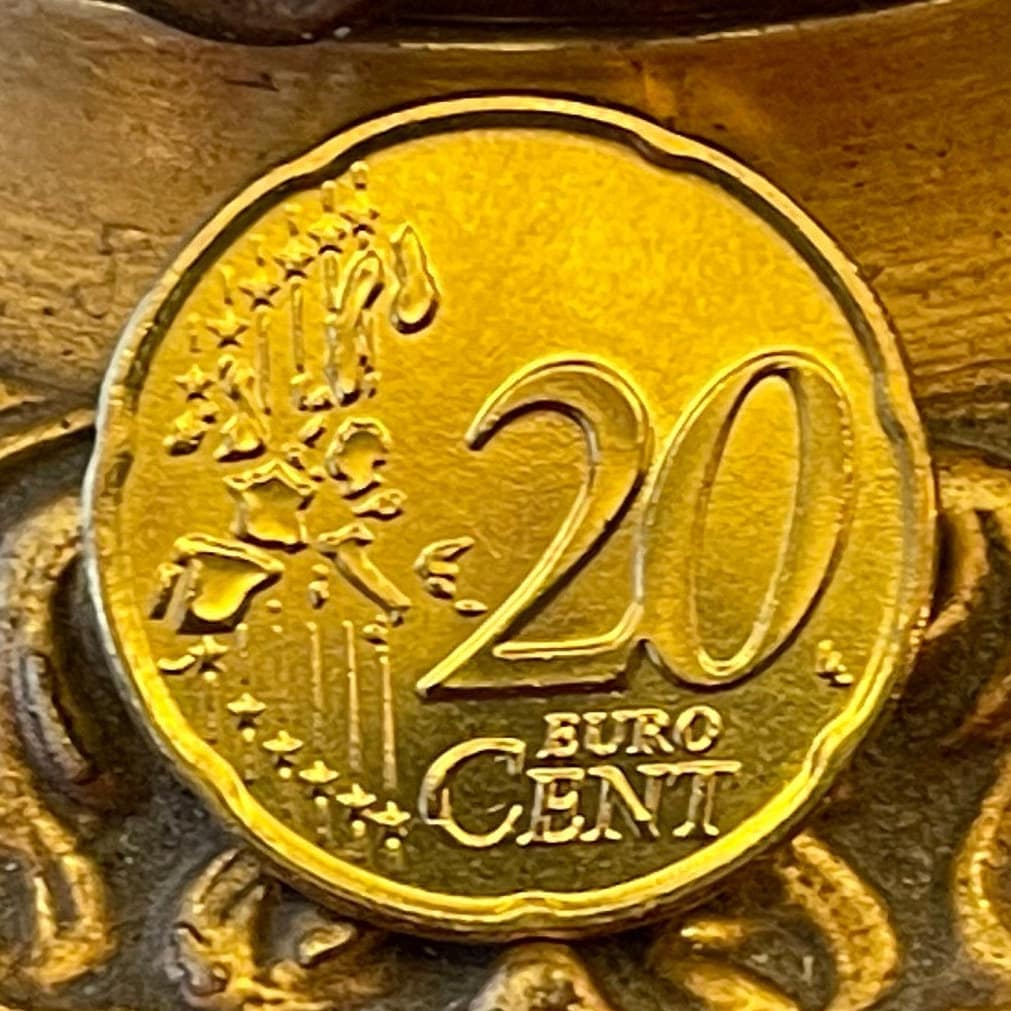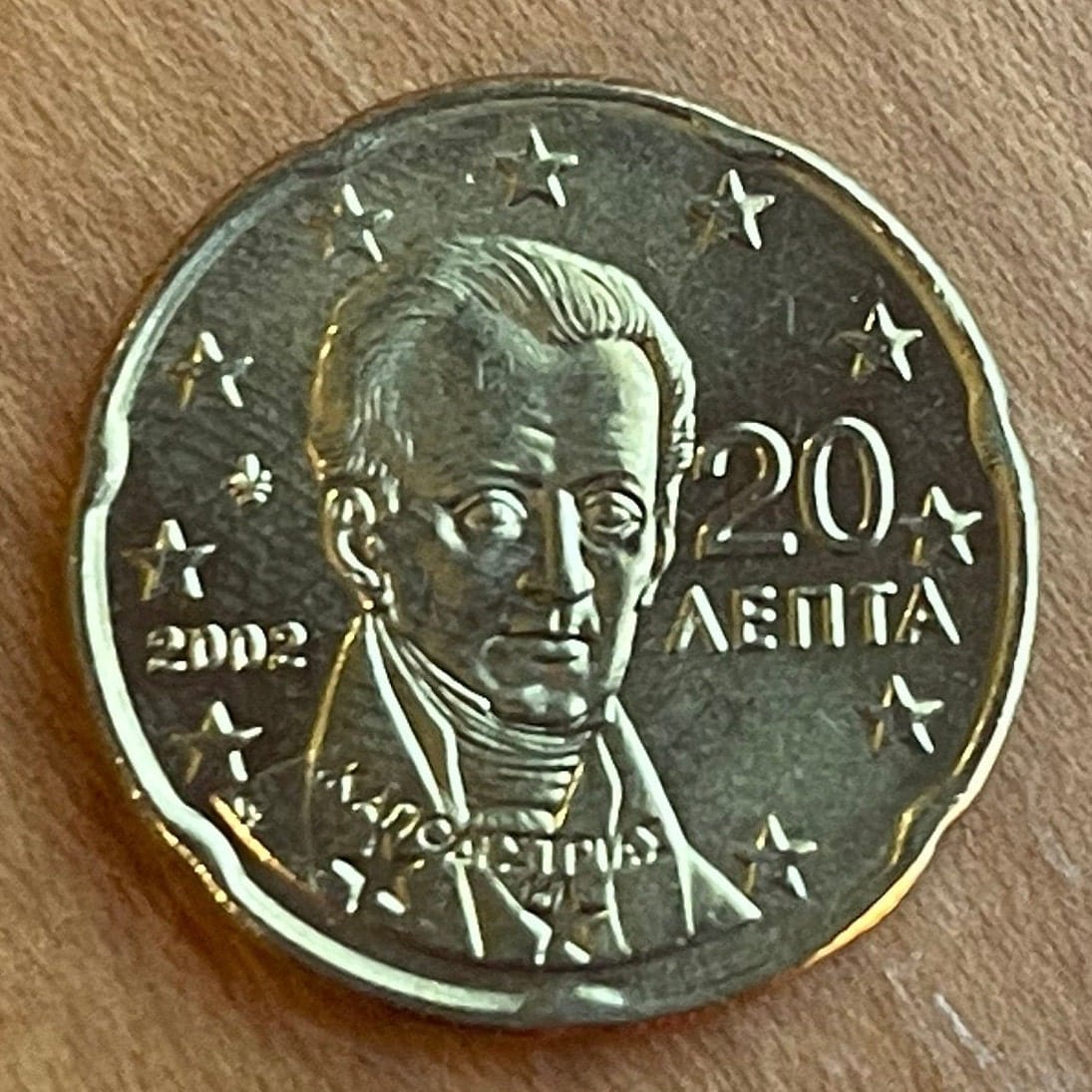elemintalshop
Count Ioannis Capodistrias 20 Euro Cents Greece Authentic Coin Money for Jewelry and (Founder of Modern Greece) (Greek Independence)
Count Ioannis Capodistrias 20 Euro Cents Greece Authentic Coin Money for Jewelry and (Founder of Modern Greece) (Greek Independence)
Couldn't load pickup availability
Count Ioannis Capodistrias 20 Euro Cents Greece Authentic Coin Money for Jewelry and Craft Making (Founder of Modern Greece) (Greek Independence)
Obverse
A portrait of Ioannis Capodistrias (1776-1831), a leading national and European politician and diplomat who became the first Governor of Greece (1830-31) following the Greek War of Independence (1821-27) accompanied with a legend indicating his name "Ι. Καποδίστριας" and the face value and is encircled by the twelve stars of Europe.
Lettering: 20 ΛΕΠΤΑ
Ι. ΚΑΠΟΔΙΣΤΡΙΑΣ
Translation: 20 Cents
I. Capodistrias
Reverse: A map, next to the face value, symbolizes the gathering of the fifteen nations of the European Union.
Lettering: 20 EURO CENT
Features
Issuer Greece
Period Third Hellenic Republic (1974-date)
Type Standard circulation coin
Years 2002-2006
Value 20 Euro Cent
0.20 EUR = 0.23 USD
Currency Euro (2002-date)
Composition Nordic gold
Weight 5.74 g
Diameter 22.25 mm
Thickness 2.14 mm
Shape Round
Orientation Medal alignment ↑↑
Number N# 117
References KM# 185, Schön# 135
Wikipedia:
Count Ioannis Antonios Kapodistrias (11 February 1776 – 9 October 1831), sometimes anglicized as John Capodistrias was a Greek statesman who served as the Foreign Minister of the Russian Empire and was one of the most distinguished politicians and diplomats of Europe. After a long and distinguished career in European politics and diplomacy he was elected as the first head of state of independent Greece (1827–31). He is considered the founder of the modern Greek state, and the architect of Greek independence.
*****
Kapodistrias studied medicine, philosophy and law at the University of Padua in 1795–97. When he was 21 years old, in 1797, he started his medical practice as a doctor in his native island of Corfu. In 1799, when Corfu was briefly occupied by the forces of Russia and Turkey, Kapodistrias was appointed chief medical director of the military hospital. In 1802 he founded an important scientific and social progress organisation in Corfu, the "National Medical Association", of which he was an energetic member.
*****
In 1809 Kapodistrias entered the service of Alexander I of Russia. His first important mission, in November 1813, was as unofficial Russian ambassador to Switzerland, with the task of helping disentangle the country from the French dominance imposed by Napoleon. He secured Swiss unity, independence and neutrality, which were formally guaranteed by the Great Powers, and actively facilitated the initiation of a new federal constitution for the 19 cantons that were the component states of Switzerland, with personal drafts.
Collaborating with Anthimos Gazis, in 1814 he founded in Vienna the "Philomuse Society", an educational organization promoting philhellenism, such as studies for the Greeks in Europe.
In the ensuing Congress of Vienna, 1815, as the Russian minister, he counterbalanced the paramount influence of the Austrian minister, Prince Metternich, and insisted on French state unity under a Bourbon monarch. He also obtained new international guarantees for the constitution and neutrality of Switzerland through an agreement among the Powers. After these brilliant diplomatic successes, Alexander I appointed Kapodistrias joint Foreign Minister of Russia (with Karl Robert Nesselrode).
*****
Kapodistrias moved to Geneva, where he was greatly esteemed, having been made an Honorary Citizen for his past services to Swiss unity and particularly to the cantons. In 1827, he learned that the newly formed Greek National Assembly had, as he was the most illustrious Greek-born politician in Europe, elected him as the first head of state of newly liberated Greece, with the title of Kyvernetes (Κυβερνήτης – Governor) for a seven-year term. A visitor to Kapodistrias in Geneva described him thus: "If there is to be found anywhere in the world an innate nobility, marked by a distinction of appearance, innocence, and intelligence in the eyes, a graceful simplicity of manner, a natural elegance of expression in any language, no one could be more intrinsically aristocratic than Count Capo d'Istria [Kapodistrias] of Corfu". Under the aristocratic veneer, Kapodistrias was an intense workaholic, a driven man and "an ascetic bachelor" who worked from dawn until late at night without a break, a loner whom few really knew well. Despite his work ethic, Kapodistrias had what the British historian David Brewer called an air of "melancholy fatalism" about him. Kapodistrias once wrote about the cause of Greek freedom that "Providence will decide and it will be for the best".
********
The most important task facing the governor of Greece was to forge a modern state and with it a civil society, a task in which the workaholic Kapodistrias toiled at mightily, working from 5 am until 10 pm every night. Upon his arrival, Kapodistrias launched a major reform and modernisation programme that covered all areas. Kapodistrias distrusted the men who led the war of independence, believing them all to be self-interested, petty men whose only concern was power for themselves. Kapodistrias saw himself as the champion of the common people, long oppressed by the Ottomans, but also believed that the Greek people were not ready for democracy yet, saying that to give the Greeks democracy at present would be like giving a boy a razor; the boy did not need the razor and could easily kill himself as he did not know to use it properly. Kapodistrias argued that what the Greek people needed at present was an enlightened autocracy that would lift the nation out of the backwardness and poverty caused by the Ottomans and once a generation or two had passed with the Greeks educated and owning private property could democracy be established. Kapodistrias's role model was the Emperor Alexander I of Russia, who he argued had been gradually moving Russia towards the norms of Western Europe during his reign, and he had unfortunately died before he had finished his work.
******
In 1831, Kapodistrias ordered the imprisonment of Petrobey Mavromichalis, who had been the leader of the successful uprising against the Turks. Mavromichalis was the Bey of the Mani Peninsula, one of the wildest and most rebellious parts of Greece—the only section that had retained its independence from the Ottoman Empire and whose resistance had spearheaded the successful revolution. The arrest of their patriarch was a mortal offence to the Mavromichalis family, and on September 27, Kapodistrias was assassinated by Petrobey's brother Konstantis and son Georgios Mavromichalis on the steps of the church of Saint Spyridon in Nafplion.
Kapodistrias woke up early in the morning and decided to go to church although his servants and bodyguards urged him to stay at home.[62] When he reached the church he saw his assassins waiting for him. When he reached the church steps, Konstantis and Georgios came close as if to greet him.[55] Suddenly Konstantis drew his pistol and fired, missing, the bullet sticking in the church wall where it is still visible today. Georgios plunged his dagger into Kapodistrias's chest while Konstantis shot him in the head. Konstantis was shot by General Fotomaras, who watched the murder scene from his own window. Georgios managed to escape and hide in the French Embassy; after a few days he surrendered to the Greek authorities. He was sentenced to death by a court-martial and was executed by firing squad.[62] His last wish was that the firing squad not shoot his face, and his last words were "Peace Brothers!"
Share



















